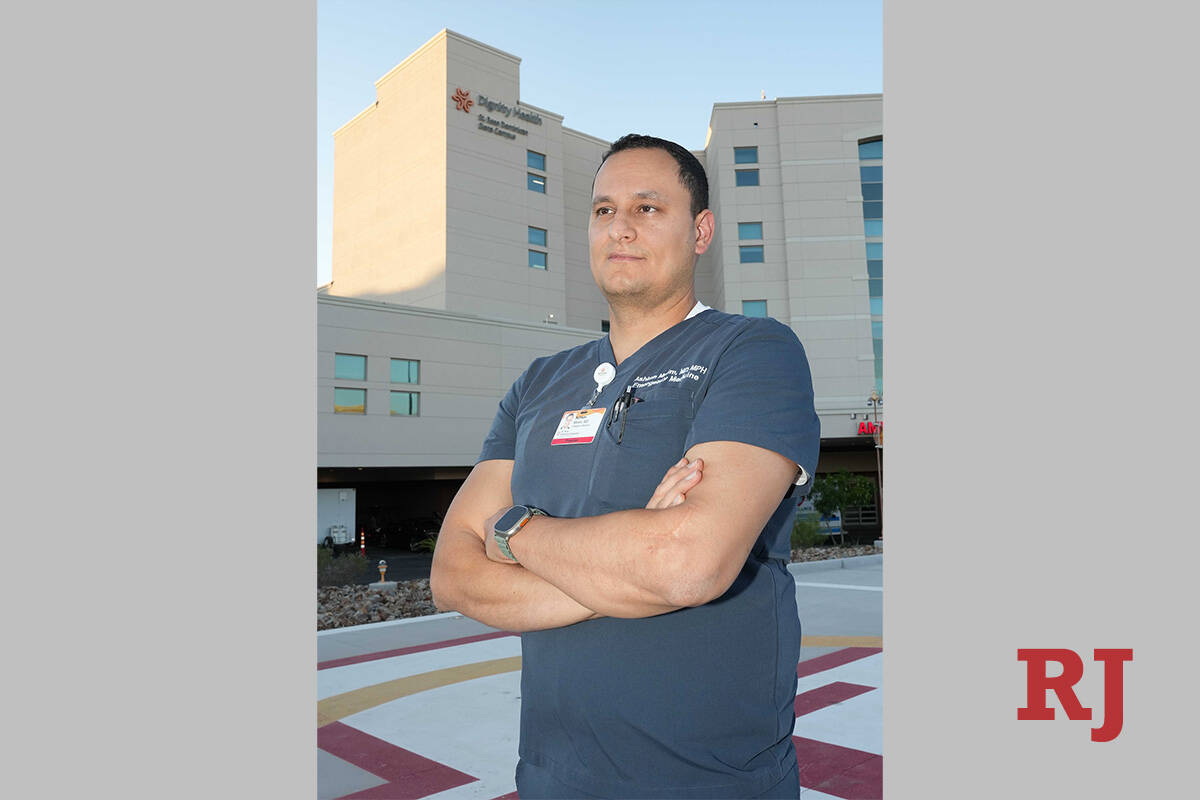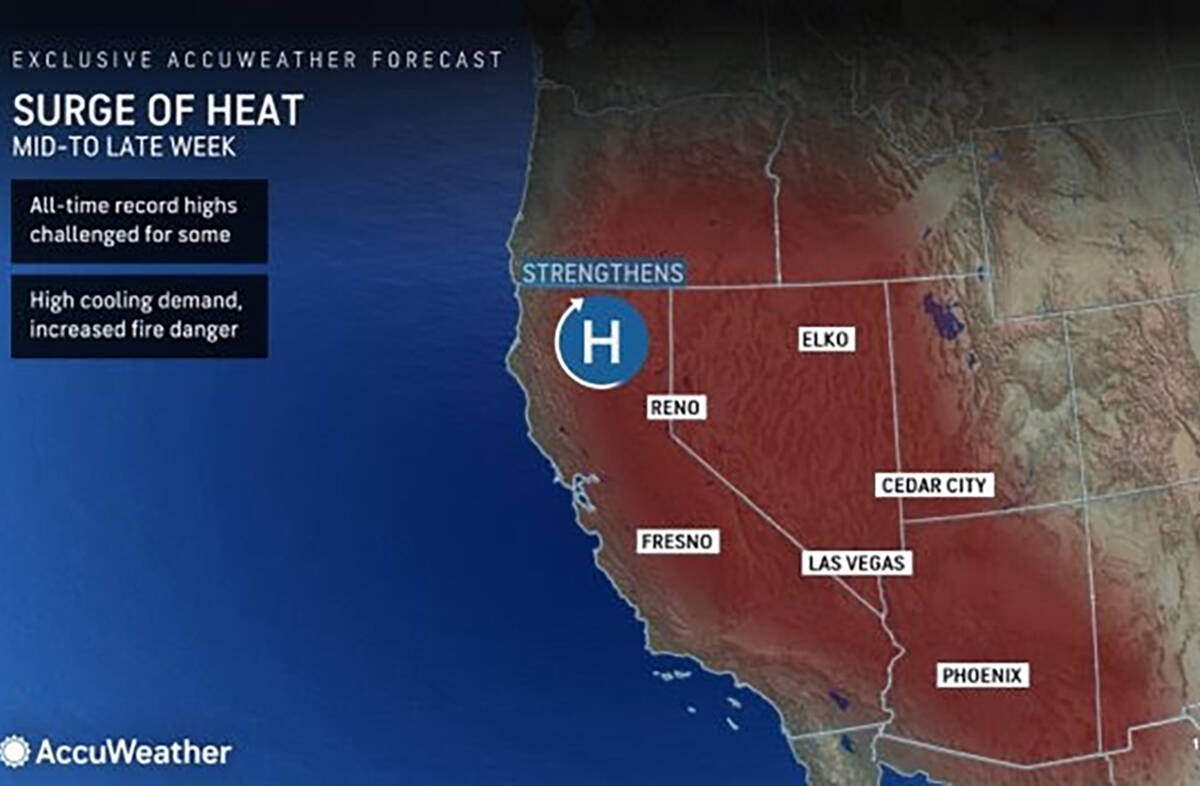‘Heat can get to anyone’: Medical providers stress safety this summer
With temps reaching 120 degrees, medical officials are stressing that Southern Nevadans must pay attention to their bodies and prepare for prolonged days of excessive heat that can prove deadly.
“It hit early like in May, and it hit hard,” said emergency room Dr. Ashkan Morin of St. Rose Dominican Hospitals. “And it seems later in the day, too. I finished work at 10 p.m. the other day, and it was still 96 degrees. No break even at night.”
June finished with a record daily average temperature at 94.6 degrees, and 28 of the 30 days reached 100 or higher. The National Weather Service forecast calls for prolonged and dangerous heat during at least the first week in early July.
Anyone can become a heat victim, according to Dr. Ketan Patel, associate medical director of University Medical Center’s Adult Emergency Department.
“No one is safe. It just depends how long your exposure is. Heat can get to anyone,” Patel said. “With consecutive days of high temperatures it can lead to kidney failure, strokes and heart attacks. Heat can trigger all those issues.”
Without providing numbers, Patel acknowledged that UMC has had patients die because of heat-related issues.
Living and working in hot temperatures often affects the young and elderly first, as well as those with chronic conditions, he said.
Elderly people with medical issues, such as high blood pressure and kidney problems, have a higher susceptibility to the heat causing medical problems.
Radiation burns from the heat can develop to third-degree burns requiring major treatment, Patel said.
Pavement burns are also a problem. UMC reported 22 hospitalizations for pavement burns in June through the 29th, compared with three hospitalizations last June.
“We always see a high increase in pavement burns,” Patel said of the summer months. “People often don’t realize how hot the pavement can be. They faint and pass out and fall to the hot pavement and are there for several minutes and get severe burns.”
Avoiding heat issues
Prevention, anticipation and education are among Patel’s top recommendations for all Southern Nevada residents.
“Arming yourself with education and anticipating what you might face are essential,” he said. “Stay out of the heat, do tasks early in the day and keep a pulse on your own health.”
Hydration and good health practices are vital, Patel said.
He also noted a key factor that some medications could exacerbate heat issues.
Among the variety of drugs and over-the counter treatments, some common drugs that can cause heat issues include blood pressure and pain medications, as well as allergy medications.
“Do your due diligence on your medications with your physician and family care doctor,” Patel said. “A large part of burn-related illnesses with the compounding days of heat can be prevented to a large part.”
‘Rough month’
“It’s been a rough month,” said Sean Collins, a Clark County Fire Department assistant chief in charge of emergency medical services. “But normal for summer conditions.”
The department protocols for treating people affected by the heat include getting them into any possible shade, putting cold packs on the body, removing restrictive clothing, IV fluids and cooling in an air-conditioned ambulance.
Clark County firefighters use “passive cooling,” which includes use of ice packs, moving people to cool off inside air-conditioned rescue vehicles, fanning, treating with fluids, etc., said county spokeswoman Stacey Welling.
The department has not gone so far as to adopt a new treatment being tested by some EMT units in Phoenix, Arizona, where critically hot heat victims are immersed in a plastic tub with water and ice.
Collins said he is aware of the treatment after seeing a video.
“We haven’t made that step,” he said. “There are a lot of cost factors and other things such as space in the back of an ambulance to consider.”
Henderson is the first fire department in Southern Nevada to use cold-water immersion treatment for severe heat victims. The “Polar Pods” will be in nearly all Henderson Fire Department units.
We are the first fire department in the valley to use polar ice pods! 💪 This device helps us treat our patients and firefighters who are experiencing a heat emergency.
Polar pods use ice and cold water to help cool the body’s temperature and avoid serious illness. pic.twitter.com/JTNH9hCZYy
— Henderson Fire (@HendFireDept) July 4, 2024
Homeless hit hard
Morin underscored the dangerous situation faced by the valley’s homeless population.
“We are seeing more frequent visits from the unhoused population,” he said. “They walk around all day in bare feet or socks because of no shoes. When we check their feet, they often have second-degree burns.”
He said two older patients fell outside and were down on the pavement for two or three minutes and had significant burns on their backs and buttocks.
“It only takes a few minutes for very delicate skin to burn and be very detrimental to their health.”
Morin said he has not seen any deaths directly related to heat stroke, but some patients were “sick enough that required a lot of resources to get them to feel better.”
Contact Marvin Clemons at mclemons@reviewjournal.com.
























